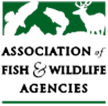
|
|
Contact: Patricia Allen, 202-838-3461 / Fax 202-350-9869, pallen@fishwildlife.org |
Statement from the Association of Fish & Wildlife Agencies Supporting the Introduction of the Chronic Wasting Disease Transmission in Cervidae Study Act
Washington The Association of Fish & Wildlife Agencies supports the introduction of the Chronic Wasting Disease Transmission in Cervidae Study Act. This bill would enlist the assistance of the National Academies of Science to help identify the predominant transmission pathways for the spread of Chronic Wasting Disease (CWD), evaluate current practices to manage and control the disease, and recommend prioritized research and other actions that should be taken to reduce and control the spread of CWD across the country. Senator John Barrasso (R-WY), along with Senator Doug Jones (D-AL) and Senator Michael Bennet (D-CO) introduced the legislation on November 15, 2018.
“The Association strongly supports this important legislation which, if passed, would aid to combat this serious wildlife health issue,” said Ed Carter, President of the Association of Fish and Wildlife Agencies and Executive Director of Tennessee Wildlife Resources Agency. “Chronic wasting disease is a fatal neurological disease that affects members of the deer family and may be one of the biggest challenges in modern wildlife conservation history.”
Chronic Wasting Disease is a 100% fatal disease of deer, elk, moose, reindeer, and other species of the family Cervidae which continues to spread across North America, with reported cases now in 25 states and 4 Canadian provinces, and the newest CWD positive detections are most recently in Mississippi, Michigan and Ontario.
“The Association applauds and sincerely thanks Senator John Barrasso (WY), Chairman of the Senate Committee on Environment and Public Works, and the other bill sponsors for introducing the Chronic Wasting Disease Transmission in Cervidae Study Act,” said Executive Director Ron Regan.
The Association of Fish & Wildlife Agencies represents North America’s fish and wildlife agencies to advance sound, science-based management and conservation of fish and wildlife and their habitats in the public interest. The Association represents its state agency members on Capitol Hill and before the Administration to advance favorable fish and wildlife conservation policy and funding and works to ensure that all entities work collaboratively on the most important issues. The Association also provides member agencies with coordination services on cross-cutting as well as species-based programs that range from birds, fish habitat and energy development to climate change, wildlife action plans, conservation education, leadership training and international relations. Working together, the Association’s member agencies are ensuring that North American fish and wildlife management has a clear and collective voice.